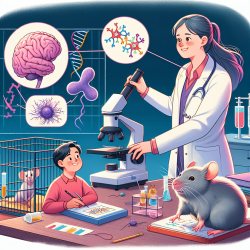Introduction
In the quest to enhance therapeutic outcomes for children with autism spectrum disorder (ASD), recent research has shed light on the molecular intricacies of Phelan-McDermid Syndrome (PMS), a genetic condition closely associated with ASD. The study titled Transcriptional signatures of participant-derived neural progenitor cells and neurons implicate altered Wnt signaling in Phelan-McDermid syndrome and autism explores the transcriptional changes in neural cells, revealing potential pathways for intervention.
Understanding the Research
PMS is characterized by deletions or mutations in the SHANK3 gene, leading to a range of neurodevelopmental challenges. The study utilized human-induced pluripotent stem cells (hiPSCs) derived from individuals with PMS and their unaffected siblings to explore the transcriptional differences. Through genome-wide RNA sequencing, researchers identified significant alterations in gene expression, particularly in pathways related to Wnt signaling, synaptic plasticity, and neurodevelopment.
Key Findings
- Wnt Signaling Pathway: The study highlights the under-expression of genes involved in the Wnt signaling pathway, a critical pathway for neuronal development and synaptic plasticity.
- Synaptic Function: Over-expressed genes in PMS were linked to synaptic density and plasticity, indicating potential targets for therapeutic intervention.
- Gene Co-expression Networks: The analysis identified gene modules associated with developmental delay and intellectual disability, providing insights into the genetic underpinnings of PMS and ASD.
Implications for Practitioners
For speech-language pathologists and other practitioners, understanding these molecular pathways can inform the development of targeted therapies. By focusing on the Wnt signaling pathway and synaptic function, practitioners can explore interventions that may enhance neurodevelopmental outcomes in children with PMS and ASD.
Additionally, the study underscores the importance of personalized medicine. By integrating genetic insights into therapy planning, practitioners can tailor interventions to the unique genetic profiles of their clients, potentially improving efficacy and outcomes.
Encouraging Further Research
While this study provides valuable insights, it also highlights the need for further research. Practitioners are encouraged to stay informed about ongoing studies and to consider participating in research initiatives. Collaboration between researchers and clinicians is crucial for translating these findings into effective therapeutic strategies.
Conclusion
The exploration of transcriptional changes in PMS offers a promising avenue for improving therapeutic approaches in ASD. By focusing on data-driven insights and integrating them into practice, we can unlock new possibilities for enhancing the lives of children with neurodevelopmental disorders.
To read the original research paper, please follow this link: Transcriptional signatures of participant-derived neural progenitor cells and neurons implicate altered Wnt signaling in Phelan-McDermid syndrome and autism.










